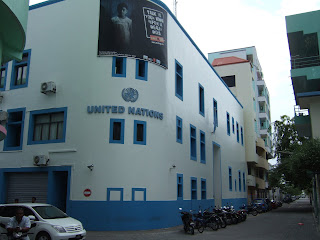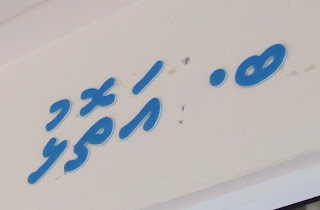The project plan for phase 2 has been redesigned and considerably slimmed down with only two more trips planned and an official launch on May 10'th which is Maldives Childrens' Day.
More meetings with social workers and Dept of National Planning to discuss reporting requirements.
When not in meetings I've spent the last two days finishing the end of project report for phase 1, rather than finishing off the project. I do believe I may have fallen into the unicef way of life.
Coast Guard boat sailing between Male' and Dhoonidhoo
On another note, the restuarant staff at the hotel have exhibited another bout of haplessness at lunchtime when the beef fried noodles I ordered arrived as beef fried rice, apparantly destined for another diner. I wonder if he got my chilli sauce as well since what I got was plain old tomato ketchup!
For no other reason than it's one of four streets on Male' I know the name of










































